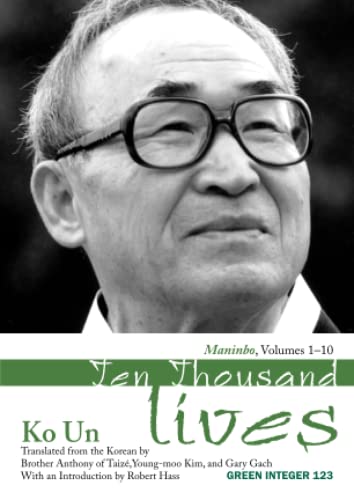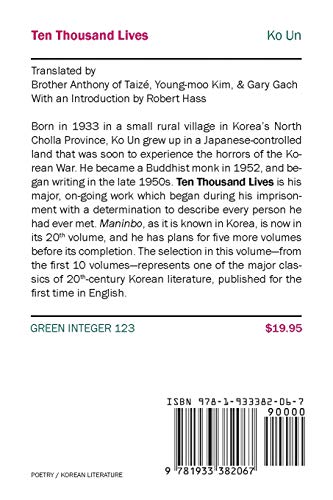Ten Thousand Lives (Ten Thousand Lives: Maninbo)
₱1,654.00
Product Description
Born in 1933 in a small rural village in Korea’s North Cholla Province, Ko Un grew up in a Japanese-controlled land that was soon to experience the horrors of the Korean War. He became a Buddhist monk in 1952, and began writing in the late 1950s.
Ten Thousand Lives is his major, ongoing work which began during his imprisonment with a determination to describe every person he had ever met.
Maninbo, as it is known in Korea, is now in its 20th volume, and he has plans for five more volumes before its completion. The selection in this volume—from the first 10 volumes—represents one of the major classics of 20th-century Korean literature, and is published for the first time in English.
Review
… masterwork … recording the life of every person Korean writer and activist Ko Un has ever known or known of. —
Buddhadharma, Fall 2005
… one of the most extraordinary projects in world literature in this part of the century. The poems are exquisite. —
Robert Hass, Korean Culture, Spring 1999
The unique space where anti-traditional Modernism and anti-western Traditionalism meet is where the poetry of Ko Un originates —
Choi Wan-Shik, Conference on
From the Author
In May 1980 I was arrested and going to be court-martialed by the emerging dictatorship, accused of “rebellion.” The people arrested with me were the now-deceased priest, Moon Ik-hwan, and the now-former president, Kim Dae-jung. We didnt know where anyone was, whether alive or dead. If the single weak electric bulb went out, it was a black room, so we were full of fear, for we felt we might be killed at any moment — and the thought that really sustained my life at that moment was that if I were to get out of here I would have to write these poems. I thought that even if I didnt do it, that thought in itself would be a source of strength.
These poems represent my other-centered poems. So much modern Korean poetry is centered on the *self*; even if it is love poetry, the other person, the one I love has to come to me — or else it is the I who is there walking, it is I who is smelling the flowers.
This “I-centered way” of experiencing life distorts — the others are there and they become the object of my poem. I have many other kinds of works, but if this were not in my body of work, somehow I would have failed in my task, not only in the matter of depicting others, but also in the way of somehow transcending “self.”
It is the obligation of the poet to celebrate each person.
From the Back Cover
Born in 1933 in a small rural village in Korea’s North Cholla Province, Ko Un grew up in a Japanese-controlled land that was soon to experience the horrors of the Korean War. He became a Buddhist monk in 1952, and began writing in the late 1950s.
Ten Thousand Lives is his major, on-going work which began during his imprisonment with a determination to describe every person he had ever met.
Maninbo, as it is known in Korea, is now in its 20th volume, and he has plans for five more volumes before its completion. The selection in this volume — from the first 10 volumes — represents one of the major classics of 20th century Korean literature, published for the fist time in English
About the Author
Ko Un is arguably Koreas most important living poet. His literary career reflects the major developments in Korean modern poetry, and his styles and genres have ranged from symbolist, hermetic, epic, lyric, realist, populist, dissident, pastoral, nostalgic, prophetic, and spiritual. Moreover, hes not only been an eyewitness to history hes played an active part in it.
Born in 1933, he became a Buddhist monk following his devastating experiences during the Korean War. He spent the next decade moving from one temple to another, traveling the whole of Korea as a mendicant pilgrim, living on alms. In 1960, he published his first poems, under the sponsorship of the celebrated poet Midang. He disrobed later that y














